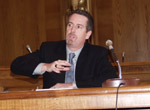Registration
You will receive an email confirming your registration.
The panel offered background and analysis of the on-going discussions between Russia and the United States on the nature and details of nuclear reductions in both countries, and the broader strategic relationship now being crafted. The panelists discussed the manner and timing of these reductions, the impact of U.S. withdrawal from the ABM Treaty, the new Russian views of the United States and NATO, the impact of the war on terrorism on the U.S.-Russian relationship and the new, broader strategic relations, cooperation in Central Asia, the Caucuses and Iraq. The briefing was held in the Senate Dirksen building, and preceeded the Senate Foreign Relations Committee hearings on U.S.-Russian Strategic Relations.
The panel included the following Carnegie Experts:
- Joseph Cirincione- Director, Non-Proliferation Project
- Andrew Kuchins- Director, Russian-Eurasian Program
- Lilia Shevtsova-Senior Associate, Russian-Eurasian Program
Click here for a summary of the panel's remarks.
Additional Resources:
Carnegie Endowment's Russian-Eurasian Program
Secretary of State Colin Powell, Testimony before the Senate Foreign Relations Comittee, 5 February 2002
Transcript of President Bush's announcement of the U.S. decision to withdraw from the ABM Treaty, 13 December 2001.
"What If the New Strategic Framework Goes Bad?" by Joseph Cirincione and Jon B. Wolfsthal, originally appearing in Arms Control Today, November 2001.
Joint Statement by President George W. Bush and President Vladimir V. Putin on a New Relationship Between the United States and Russia, 13 November 2001
"U.S.-Russia Nuclear Reductions" by Jon B. Wolfsthal, Foreign Policy in Focus, Volume 6, Number 39, November 2001 Op-Ed
"De-Alerting Russian-U.S. Nuclear Forces and the Path to Lowering the Nuclear Threat" by Project Leader Alexander Pikayev in cooperation with the Institute of Global Economics and International Relations and the Back From the Brink Campaign, October 31, 2001.
"The End of Unilateralism? Arms Control After September 11," Arms Control Today, by Lawrence J. Korb and Alex Tiersky, October 2001
"Offense, Defense, and Unilateralism in Strategic Arms Control," Arms Control Today, by Rose Gottemoeller, September 2001
United States Nuclear Forces 2001
Click Here to Return to Proliferation News and Resources
Summary prepared by Project's Junior Fellow, Andrew Krepps
